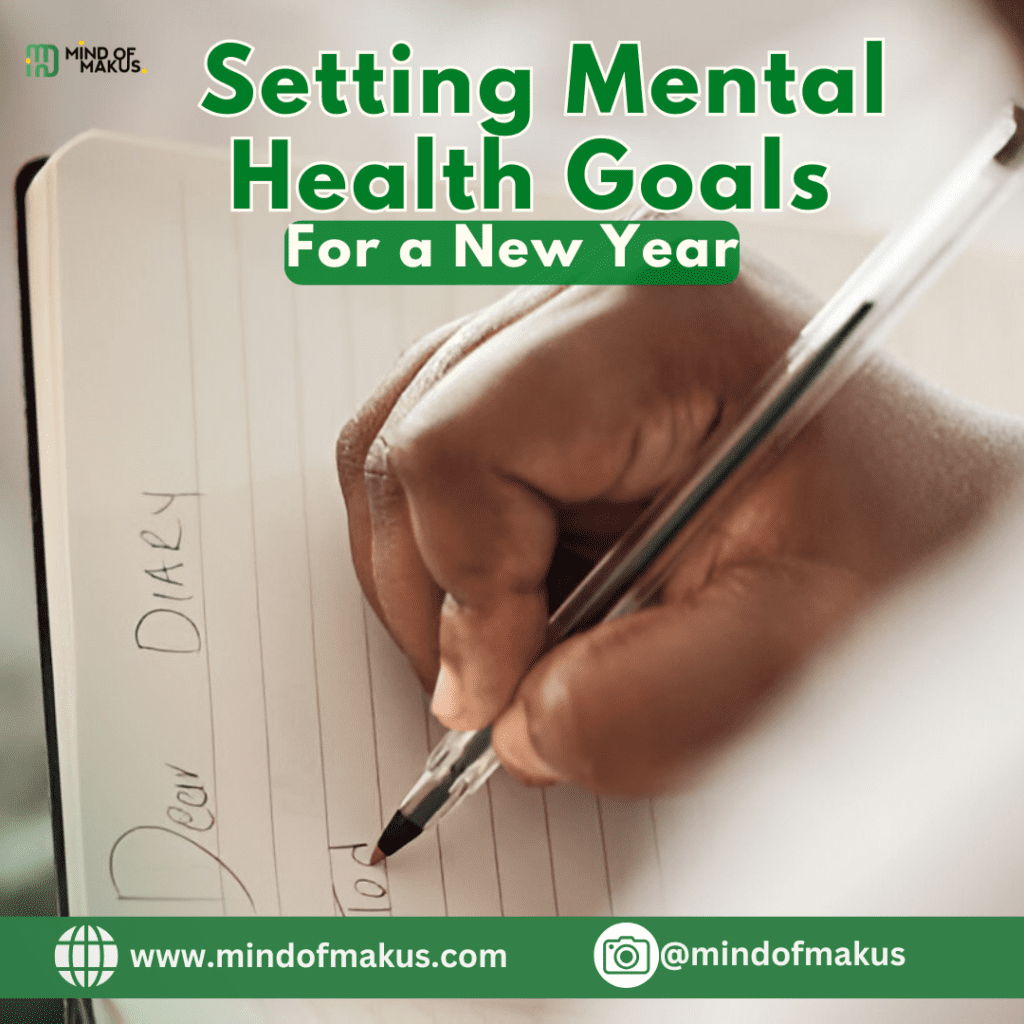Hi Lovelies,
The start of a new year often comes with high expectations and ambitious resolutions.
While goal-setting can be motivating, it’s easy to fall into the trap of setting overwhelming expectations—especially when it comes to doing better with mental health.
We often keep it vague with no detailed breakdown on how we would achieve it really. Hoping somehow the angels will hear your wishes and abracadabra! It will happen. Nope bro! Hahahahaa!


Let’s aim to set goals and develop action plans that aim for progress. We will discuss some ways we can do this, documenting our goals, and making sure we have small actions that are achievable, meaningful, and aligned with our values. The goal is to reduce the barriers to achieving them to almost zero.
Building on the principles of protecting your energy and setting boundaries (as discussed in our previous post, The Art of Saying No), this blog will guide you through a goal-setting journey focused solely on mental health support for you. Abi you no need am?
Why Mental Health Goals Matter
If like me you are a busy adult in this century, we have been through a lot. First of all, things are not running the way they should, we are not well supported professionally, personally and even in the larger social context. There is a lot of pressure and it is getting worse.
No one is coming to save us, we have to develop strategies that support our survival in such desperate times. Na person wey dey alive dey chop money, so let’s think about how to nurture our emotional well-being and create habits that supports a balanced and fulfilling life. Setting these goals helps:
- Prioritize Self-Care: Make your mental health a top priority amidst life’s demands. So when you plan your week or make notes for the day, Put something for you on top, something that support your mental health.
- Create Structure: Having clear goals provides direction and purpose. Break down that something into small action, for example going for a walk during lunch time in the office helps me loads, I eat quickly and step out of the building for a 10minute walk. It’s in my diary.
- Track Progress: Small wins along the way build confidence and resilience. I monitor my steps for the day and applaud myself when I have walked over 5k steps in a 12hr work day. Yaaay!
By focusing on what truly matters, you can protect your energy and approach each day with greater intention. What matters to you? What is that thing you want to do daily to set up yourself for success when it comes to better mental health?
Is it sleeping better, eating healthier meals, talking a course on positive community, booking a relationship therapist, getting that ADHD assessment done, taking some medication, going outdoors more….. the list is endless. Do it, start today.


How to Set Realistic Mental Health Goals
The key to successful goal-setting is finding a balance between challenging yourself and being compassionate with yourself. Here are actionable tips to get started:
1. Reflect on the Past Year
Before setting new goals, take time to reflect on the previous year. Ask yourself:
- What worked well for my mental health?
- What challenges did I face?
- What lessons did I learn about self-care and boundaries?
This reflection will help you identify patterns and areas for growth. It’s also good for objective assessment of what stopped you from progressing on things that started and stopped. How to think around eliminating those barriers or even just reducing them.
When I started my lunch time walks, I was doing a spiritual exercise that I needed privacy for and not having a private office made me start going for walks. I realized that the barrier for going daily was it not being linked with a higher purpose, so I started calling it my prayer walk. It shot me out of the door faster, and I started looking forward it because now it’s linked to something important, not just leisure.
2. Use the SMART Framework
Set goals that are Specific, Measurable, Achievable, Relevant, and Time-bound:
- Specific: Define your goals clearly. Instead of saying, “I want to reduce stress,” try, “I’ll meditate for 10 minutes each morning.”
- Measurable: Choose goals you can track, such as journaling three times a week or attending therapy sessions monthly.
- Achievable: Be realistic about what you can accomplish given your current circumstances.
- Relevant: Align goals with your personal values and priorities.
- Time-bound: Set a timeline to review your progress and adjust as needed.
3. Focus on Small, Incremental Changes
Big changes rarely happen overnight. Break larger goals into smaller, manageable steps. For example:
- Large Goal: Build a consistent self-care routine.
- Small Steps: Start with one self-care activity per week, such as a relaxing bath, reading, or a walk in nature.
4. Incorporate Boundaries
As discussed in The Art of Saying No, setting boundaries is essential for mental health. Make it a goal to protect your energy by saying no to commitments that don’t align with your values or capacity.
5. Prioritize Connection
Loneliness and isolation can take a toll on mental health. Set goals to nurture your relationships, such as scheduling regular check-ins with friends or joining a supportive community.
6. Be Flexible and Forgiving
Life is unpredictable, and goals may need to be adjusted. If you face setbacks, practice self-compassion and remind yourself that progress, not perfection, is the goal.


Examples of Realistic Mental Health Goals
- Practice mindfulness by meditating for 5–10 minutes daily.
- Journal once a week to process thoughts and emotions.
- Schedule monthly therapy or counseling sessions.
- Limit social media use to 30 minutes per day.
- Set a bedtime routine to improve sleep hygiene.
- Join a hobby group to meet new people and reduce loneliness.
- Take one mental health day per month to recharge.
Incorporating Self-Compassion
As you work toward your goals, remember that self-compassion is a cornerstone of mental health. Celebrate small victories, acknowledge your efforts, and speak to yourself with kindness. If a goal feels too overwhelming, it’s okay to adjust it or take a step back.
One powerful affirmation to keep in mind:
“I am doing the best I can, and that is enough.”
Make 2025 the Year of Mental Fitness
The new year offers an opportunity to reflect, reset, and realign. You can create a foundation for emotional resilience and personal growth. Remember, the journey to mental wellness is not about perfection—it’s about taking small steps each day to care for yourself and protect your energy.
Start where you are, use what you have, and take it one day at a time. Here’s to a mentally healthy and fulfilling year ahead!
Until next time, stay authentic,
Stay resilient, and continue to honour your needs.
Live wholeheartedly,
Amaka



